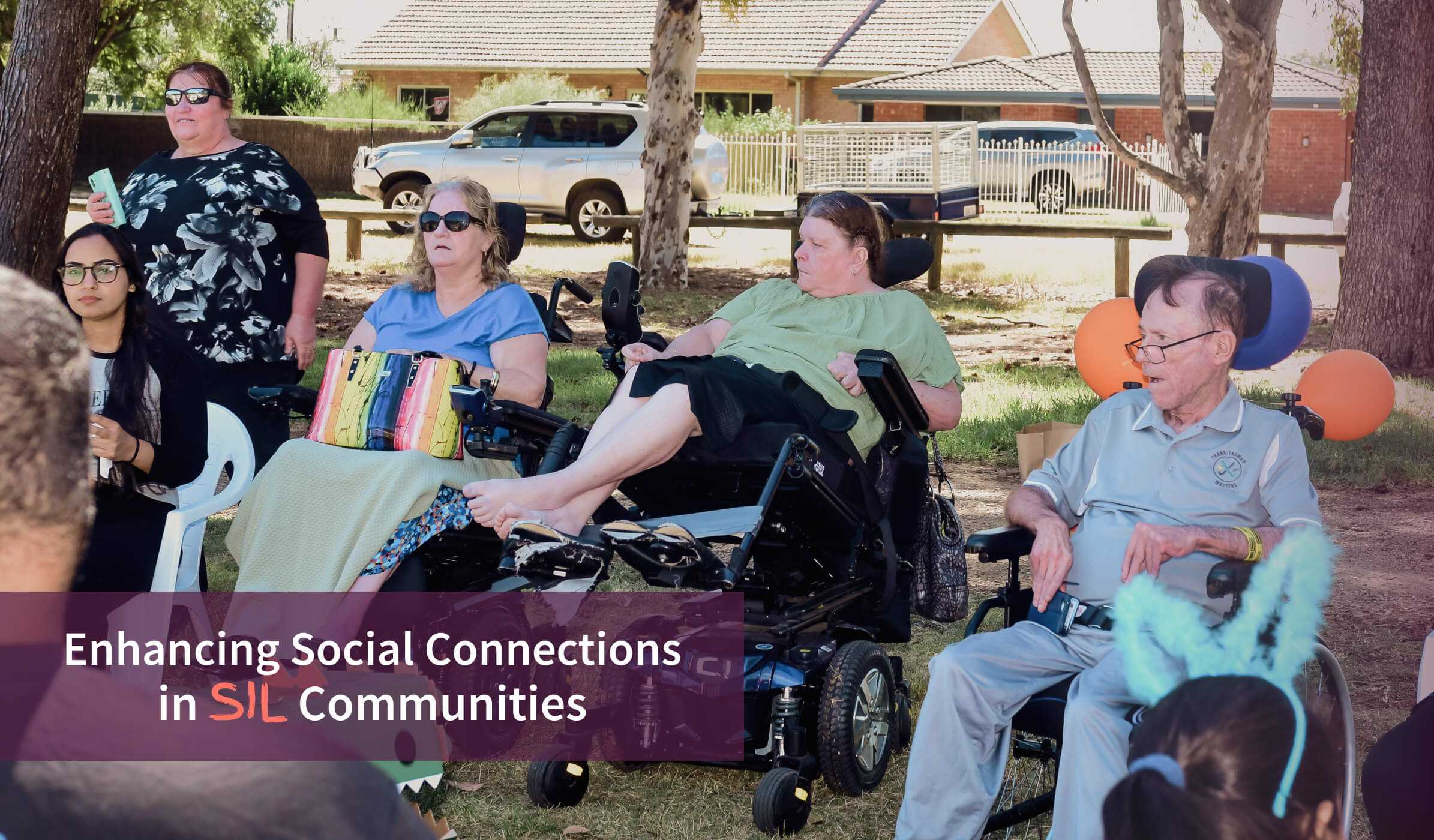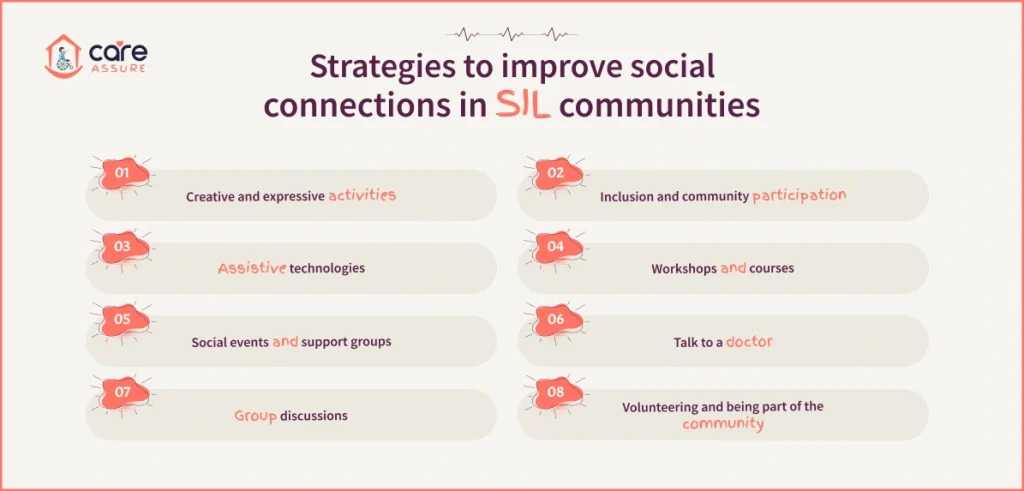Enhancing Social Connectionsin SIL Communities
April 28, 2024
|By Careassure
|12 min read

Building and maintaining social relationships is an important part of life for everyone, even people with disabilities. A strong support system of friends, family, and coworkers can greatly affect a person's mental and overall health. It's also important for building self-esteem, a sense of belonging, and a sense of accomplishment. It's impossible to say enough about social ties' importance for mental health and well-being. Adults with disabilities benefit from social connections because they give them a sense of belonging, support, and companionship. These help them feel more emotionally stable, less anxious, and more confident in their skills. Isolation, on the other hand, can make you feel lonely and depressed and even worsen your brain function over time.
Giving people with disabilities chances to meet new people, participate in community events, and join support groups or other get-togethers with people who share their interests in a SIL residence is an important part of helping them make social connections. Family, friends, and support workers are also very important for getting adults with developmental disabilities to social events and making sure they have fair chances to make friends and form relationships that matter. In this article, we will be discussing the benefits of social connections and how to improve them in SIL communities in Australia.
The benefit of social connections for mental health
People with disabilities can benefit from social connections in more ways than just feeling like they belong, getting help, and having someone to talk to. A person's mental stability and the amount of stress and anxiety they may feel can be greatly improved by spending time with other people. These good contacts can also help fight the loneliness and depression that come with being alone a lot of the time. Participating in social events can also help people with developmental disabilities improve their communication and social skills, which can help them become more independent in the long run. These social connections may also improve cognitive abilities, generally leading to better mental health outcomes.
On the other hand, being alone a lot can be bad for your mental health. Lack of social connections can make people with disabilities feel even more alone, make their depressive symptoms worse, and slow down their brain function over time. Because of this, these people must have many chances to make and keep valuable social connections.
Advantages of social connection for people with disabilities
People with disabilities can benefit from social connection in the following ways:

1. Enhanced communication
Developing social skills can significantly improve communication for people with disabilities. Effective communication lets children clearly convey their wants, desires, and feelings, reducing frustration. Improved communication skills can also improve educational and employment prospects since people can successfully communicate their ideas to others.2. Building relationships and support network
It is impossible to overestimate the value of social skills in developing strong support networks. People with disabilities who develop these qualities are more likely to create friendships, form long-term connections with those who have gone through similar experiences, and feel a strong feeling of belonging. Building strong support networks provides a valuable framework of moral support, inspiration, and unique companionship.3. Increasing independence and self-advocacy
Developing excellent social skills enables people with disabilities to advocate for themselves and demand their needs and rights. They can actively participate in decision-making by effectively communicating their preferences and goals, ushering in a period of more autonomy and unstoppable self-determination.4. Improving emotional well-being
For people with disabilities, social connections prove to be the most important factor in promoting mental health. People experience an atmosphere of acceptance and belonging through a web of joyful social relationships, which results in a noticeable improvement in their mental health. Learning social skills facilitates the development of strong coping mechanisms to deal with stress and instilling individuals with an unbreakable spirit of resilience.Strategies to improve social connections in SIL communities
Here are top strategies that can help improve social connections in SIL communities.

1. Creative and expressive activities
Individuals with impairments benefit greatly from the encouragement of creativity and self-expression. Some popular creative group activities are:- Art therapy: This includes painting and ceramics, and they can promote emotional well-being. Several studies have found that art therapy improves communication, coping skills, and social functioning in people with autism and other difficulties.
![icon]()
- Drama and role-playing: This also can improve social skills, confidence, and cooperation. Many organisations provide specific theatrical programmes for people with impairments, fostering personal growth and expression.
![icon]()
- Music and dance sessions: These activities can help develop sensory awareness, motor abilities, and relaxation. Participating in transformative group activities, such as drum circles or adapted dancing classes, helps people with disabilities express themselves and interact.
![icon]()
2. Inclusion and community participation
For people with disabilities who are trying to use their social skills in everyday situations, the ongoing push for inclusion and NDIS community participation is very important. As long as people are urged to take part in a variety of community events and an environment is created that makes people feel included, they will always have the chance to meet a wide range of people from different backgrounds. Because of this involvement, social skills get better and grow.3. Assistive technologies
Communication gadgets and apps that are part of assistive technologies can help people with disabilities get their messages across. These technologies make communication easier, making it easier for people to say what they want and connect with others. Read more on Advancing Accessibility: Assistive Technology Innovations and how they foster better communication and social connections.4. Workshops and courses
People with disabilities can greatly improve their quality of life by learning new things. You might want to go to the following events and classes:- Workshops on computer skills and assistive technology help disabled people get around the digital world independently. By learning how to use technology well, they can get to important tools, stay in touch with family and friends, and look for work.
![icon]()
- Cooking lessons for people with disabilities teach them how to make tasty and healthy meals and also help them become more independent, organised, and reliant on themselves.
![icon]()
- Programmes that teach people with disabilities how to do jobs can help them join the workforce. These programmes offer specialised help and training to help people find useful work, boost their self-esteem, and gain more independence.
![icon]()
5. Social events and support groups
People with disabilities can make friends, share their stories, and build support networks by joining support groups and attending social events. Some popular things that support groups do are create things together, cook, have a picnic, organise events and others.6. Talk to a doctor
If you feel alone or isolated, or if your life is going through big changes or is stressful, talk to your doctor or any health expert. This can help your doctor determine what might be wrong and how to help you. Life changes, like getting sick again, getting divorced, retiring, or losing a loved one, can make people lose touch with each other. Being honest and open with your doctor can help them determine how to best help you.7. Group discussions
People with psychosocial, intellectual, or dual disabilities may find that discussion groups are a safe and supportive place to think, connect, and share their feelings.- Planning regular social events like movie nights or trips to nearby attractions helps people with disabilities get to know each other and feel linked.
![icon]()
- Participating in peer mentoring programmes can help people make friends, learn to be a leaders, and become more independent. Participants can give and receive advice and support from people who have been through similar things.
![icon]()
8. Volunteering and being part of the community
Volunteering and participating in community-based programmes can help you make real links and feel like you belong. Some options are:- Projects that include people with disabilities in community gardening help make cities better and healthier while teaching them about nature, sustainability, and working together
![icon]()
- Volunteering at animal shelters and getting treatment with animals have been shown to help people with disabilities feel better, lower their stress, and talk to others better.
![icon]()
- People with disabilities can give back to their community, build a sense of responsibility, and make new friends by participating in local service projects like park cleanups or food drives.
![icon]()
How NDIS and NDIS service providers can improve social connections
Service providers for the National Disability Insurance Scheme (NDIS) and disability support are very important in helping people with disabilities learn and use their social skills well.
1. Customised plans
Supporters for people with disabilities work with each person to make a support plan that fits their needs and goals. These plans might include improving social skills, getting people involved in their communities, and finding good support networks.2. Activities that improve skills
NDIS service providers offer a range of events that help people improve their skills, including social skills. Some examples of these kinds of activities are group outings, workshops, and training sessions that provide a safe space for people to talk, connect, and practise their social skills.3. Making environments accessible
Disability support and NDIS service providers work hard to make places easy for everyone to use and encourage social participation. This means making sure the building is physically accessible, making sure people with speech needs can get what they need, and encouraging inclusive behaviour in the community.Conclusion
SIL programmes have changed how disabled people feel about their independence, community place, and general health. They help people with disabilities reach their full potential by giving them the tools to be independent, personalised support, a better quality of life, community involvement, and flexibility. Disability group activities can make a difference in the mental, physical, and emotional health of people with psychological, intellectual, and dual disabilities by creating a space where everyone feels welcome, supported, and encouraged. Because there are so many activities, everyone can find one that fits their hobbies, strengths, and goals.
At Care Assure, we are committed to helping each of our SIL member create social connections with others. We organise events and activities that foster social interaction and relationship, making our environment a lovely place for all. If you need a friendly Supported independent Living resident, try Care Assure today!
Frequently Asked Questions (FAQs)
SIL communities can strengthen their social connections by organising social events, group activities, and shared meals where inhabitants can mingle and form relationships. Furthermore, organising peer support groups, hobby clubs, or interest-based events can help residents connect over shared interests. Giving citizens access to community resources and encouraging them to attend local events promotes social engagement.





